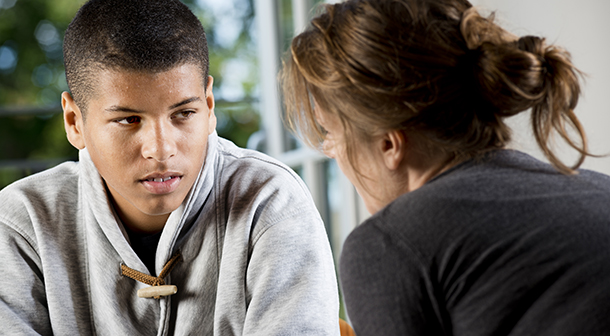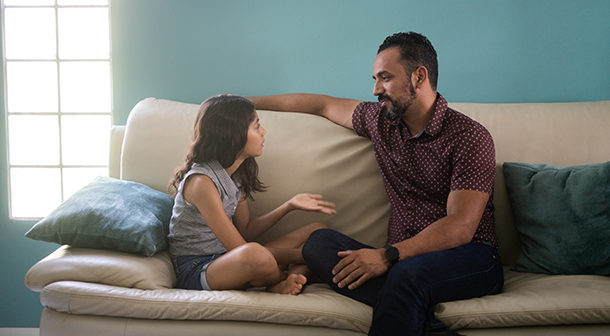Co-Parenting Tips for Parents of Teens
By GetParentingTips.com staff
Read Time: 8 Minutes
Co-parenting is when parents who are not married or romantically involved work together as a team to raise a child. Sometimes it’s also called “shared parenting.” Individuals become co-parents through many different life situations. Co-parents might be:
- The child’s biological parents who are not married.
- A biological parent and another family member.
- Any two adults who have joint legal responsibility for a child.
No matter how the situation came to be, most co-parenting arrangements follow a set of guidelines that are detailed in a parenting plan or custody agreement. Co-parents share responsibility for all parenting duties, including the child’s welfare, living arrangements, education, and activities.

The Benefits of Strong Co-Parenting
Studies have shown that when co-parents get along, children have less stress and anxiety. When co-parents fight, children may feel it is their fault. This can have a negative effect on the child’s behavior and their emotional and physical well-being. Children do best when they know that both co-parents love them and want to spend time with them. Having positive relationships with set rules and routines can help children feel secure and safe.
How to Co-Parent without Conflict
Parents want to know how to co-parent in a way that will be the best for their children. Successful co-parenting requires two key things: good communication and teamwork. For co-parents who might have been through a bad breakup or divorce, working together with an ex can be challenging. Even when finding common ground is hard, co-parents should try to put aside their differences and focus on the child’s needs. Co-parenting is a long-term arrangement, so finding ways to work together from the very beginning will makes things easier on everyone.

Keep Up Strong Communication
You don’t have to be friends with your fellow co-parent, but things will go better if you are respectful and understanding, especially when there are challenges. Children get sick. Parents get sick. Parents have to rearrange schedules during school breaks. Sometimes there are emergencies at work or unexpected work trips.
It is inevitable that co-parents will have to work together to raise their child. If the relationship is not friendly, try to keep texts and conversations short, neutral, and focused on the issue at hand. You might say something like, “Could we switch Saturdays in March?” or “What do you think about letting Sarah go to camp?” Make sure everyone is aware of school events, information from teachers, and any issues that involve your child. Even if the relationship is strained, try to communicate without blame, complaints, or rudeness.
Don’t ask children to deliver messages to the other parent. You don’t want to put kids in the middle.
Be on the Same Team
Co-parents should set rules and routines and stick to them. These are often outlined in a parenting agreement, but no matter how much you plan, co-parenting requires constant collaboration. Some co-parents find it helpful to think of co-parenting as a business relationship. As much as you can, try to keep emotions out of things and focus on what’s best for your child. Even if you don’t always agree with your co-parent, try to present a united front to your child, and don’t undermine each other. That means if your child faces a consequence from your co-parent, then you enforce it. They should in turn do the same for you.
If your relationship with your co-parent is strained, don’t vent about it to your child. It can have long-term negative consequences on their well-being and development.
How to Co-Parent Teens
When kids hit the teenage years, it’s normal for them to challenge rules, explore their independence, and act out with their parents. This is hard for all parents, but it can be especially difficult for families that are co-parenting. If kids sense their parents don’t get along, they might try to use these disagreements to their own advantage. That is when it’s more important than ever for co-parents to work together and keep communication open.
Set Consistent Rules, Routines, and Consequences
Parenting in two households is challenging but keeping things as consistent as possible will help give your child a sense of calm and security. Work with your co-parent and your teen to set firm but fair guidelines and expectations around things like behavior, grades, and chores. You should also set clear consequences for not meeting expectations. The key is to have clear and consistent communication and follow through.

Let Teens Have a Voice
As kids get older, it’s natural that they will have more school and extracurricular commitments. They’ll probably want to spend more time with their friends. All this means teens will also be likely to have more thoughts about custody schedules, rules, and family routines. This is a great time to involve your teen in the decision-making process. If it makes sense for you, let your teen help create or update the co-parenting plan. In general, courts do consider the preferences of children who are over 12 years old, so allowing your teen to be involved in decision-making could be helpful to everyone.

Know Your Teen’s Friends (and their Parents)
When your child is going out, make sure you know where your teen is headed and with whom. Also make sure there is no confusion over their set curfew or time to check in. If your child is going to a friend’s house, make sure that the friend’s parents will be home. If your child doesn’t like all the questions, remind them that their safety is your first responsibility. Communicate with your co-parent about the teen’s plans and whereabouts—don’t assume your teen is sharing this information.
Watch for Signs of Trouble
Keep an eye out for signs of distress. These could be things like anger or isolation, difficulty with school or peers, or alcohol and drug use. If you notice any of these happening, be sure to talk to your co-parent about your concerns.

Keep Talking with Your Teen
Let your teen know you’re always there to talk and listen. Have an open-door policy to discuss sensitive topics like sexuality, drugs, and alcohol. Teens need an adult they can trust to help guide them with these challenging situations. Creating a safe space for them to talk should start when they are young and continue into the teen years.
Be a Good Role Model
Be aware that your teen is watching what you do. Have a calm and respectful tone when dealing with co-parent challenges. While co-parenting can be hard, it’s also a good chance to be a great role model for your child. You can teach lifelong lessons about working through disagreements and how to stay calm when you’re frustrated. You’re also showing your child that they are more important to you than any disagreement you might have with your co-parent.

Get Ready for Teenage Issues
Co-parenting a teen will require that you make decisions as a family on big issues like dating, employment, driving, and college applications. These topics can raise multiple issues. For instance, before your teen gets a job, everyone will need to first agree whether it is the right time for them to work. If the answer is yes, then work with your teen to help determine where they will apply to work, how they will get there, and how many hours they will be allowed to work.

Be Ready for Common Conflicts
Many parents of teens (even married parents) face disagreements over similar family issues. It’s common for parents to disagree with each other around how to manage the hot-button issues of independence, responsibility, and safety. The issues that create family conflict most often include:
- Setting a curfew time and enforcing it.
- Determining the right time to drive.
- Creating realistic expectations for grades and schoolwork.
- Picking your battles with issues that might bother you but aren’t harmful to your child, such as clothing, hair style, or makeup.
- Determining how to handle serious situations: smoking, drinking, using drugs, or skipping school.
- Knowing when to step in and address situations with friends or activities that concern you.
- Setting chores and responsibilities around the house.
It’s not too early to start thinking about college. Make a plan to handle your child’s college application process and financing. Think about how your child will split time between households after high school.
Co-Parenting and Texas Law
Many co-parenting agreements are based on a parenting plan, commonly known as a custody agreement. In Texas, a parenting plan is legally binding when a judge includes it in a court order. The court may require each party to propose a parenting plan, but parents can propose one even if it is not required.
Need parenting help now?
The Texas Parent Helpline is available 24/7.
- Call 833-680-0611
- Chat with us
- Text 833-680-0611
What’s in a Parenting Plan?
In Texas, certain information must be included in all parenting plans:
Each parent’s role.
If a parent will be making major decisions for the child, the parent is a managing conservator. If the parent is entitled to spend time with their child but not make major decisions, the parent is called a possessory conservator.
How decisions will be made.
The document states how parents will share or divide rights and responsibilities about the child’s physical care, support, and education. It outlines which parent has the right to choose the child’s main residence and whether the residence must be in a certain area.
The co-parenting schedule.
The plan includes a schedule or calendar that shows when the child will be with each parent. It outlines how the co-parents will divide special days such as holidays and birthdays.
Financial support for the child.
The plan indicates whether a parent will pay child support and if so, how much. If you need to apply for child support, you can start an application. The plan also details how parents will pay for the child’s medical and dental care.

Ensuring the Best Interest of the Child
Parenting plans typically have arrangements that minimize disruptions to a child’s education, routine, and friendships. It might say that a child gets to stay at the same school or keep attending a certain summer camp. It’s also common for plans to include things that can reduce conflict or confusion. These might include:
Minimizing Conflict or Disagreements.
Plans might include ways that co-parents may use to resolve issues before going to court about child custody or child support.
Limiting Travel.
Most plans state that neither parent may take the child out of state or apply for/renew the child’s passport without written approval from the other parent.
Planning for Emergencies.
Plans usually have communication rules. For example, a plan might say that if a child is hospitalized or admitted for surgery, the parent with custody will inform the co-parent within a set amount of time.
Planning for the Future.
The plan might say that each parent will notify the other about important life issues that will affect the child, such as getting married or having additional children.
Know Your Rights and Responsibilities
Parents need to follow all visitation and child support requirements that are included in a divorce decree or custody arrangement. In Texas, unless the court rules differently, both parents have the right to:
- Get information about the child’s health, education, and welfare and discuss what decisions need to be made.
- Be able to get the child’s medical, dental, psychological, and educational records.
- Talk with medical and educational professionals.
- Consent to medical treatment for the child during an emergency.
- Attend school activities.
- Be listed as an emergency contact.
Co-Parenting Can Be Rewarding
Parenting is hard, and co-parenting can be an even harder. Successful co-parenting can take time to build, but it is worth the effort. Strong co-parenting relationships are rewarding for the entire family. Do your best to avoid conflicts and keep communication lines open, and always think about what is best for the child. In the end, co-parenting can be a great learning experience for the entire family.




